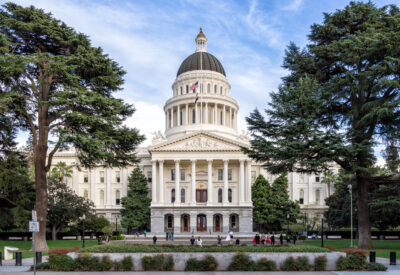California Enacts Major Water Law Reform Legislation–But More Changes Are Needed
New law explicitly authorizes State Water Board to require water users to verify their water rights
 The California Legislature has enacted and Governor Gavin Newsom recently signed into law SB 389, an important water law reform measure authored by State Senator Ben Allen.
The California Legislature has enacted and Governor Gavin Newsom recently signed into law SB 389, an important water law reform measure authored by State Senator Ben Allen.
California has one of the most antiquated and outdated water rights systems of any Western state. To put it bluntly, California currently faces a 21st century water supply crisis; relies on a 20th century water infrastructure system; and is burdened by a 19th century water rights legal regime. For a state that prides itself on innovative leadership in so many other areas of environmental and natural resources policymaking, California’s water rights laws are sorely in need of modernization.
Compared to most other states, California has a fragmented and inefficient water rights system. Those who divert surface water from state waterways to use on adjacent (“riparian”) lands don’t need to obtain prior approval from state water regulators to do so. Nor do users who divert water for shipment and application away from a waterway, if they or their predecessors claim to have secured their “appropriative” water rights before 1914. Only those California appropriators who’ve perfected their water rights after 1914 are required to comply with the permit system administered by California’s State Water Resources Control Board.
As incredible as it may seem, this means that a large percentage of current California water users operate solely on the honor system, with no obligation to seek or obtain prior approval from the Water Board for their water diversions. Indeed, many riparians and pre-1914 appropriators have taken the remarkable position that the Water Board–charged by the Legislature to oversee California’s entire water rights system–lacks authority to question, confirm or seek verification of their private water rights claims.
Senator Allen introduced SB 389 to address and put to rest any ambiguity regarding the Water Board’s power to require water users to verify their water rights claims–regardless of whether they’re subject to the Board’s permitting system. The newly-enacted legislation explicitly gives the Board the authority–which most observers believed it always had–to place that burden of proof squarely on private water users who assert those rights.
The new law also has teeth: it allows the Water Board, upon investigation of a water rights claim it ultimately finds to be undocumented or otherwise defective, to declare the offending water user’s continued diversion and use of state water to be an illegal trespass .
In sum, this new legislation explicitly places the responsibility for demonstrating the validity of a claimed water right on the private water user. And that’s as it should be, considering that longstanding California water law also explicitly provides that the waters of California are a public resource incapable of private ownership.
SB 389 is actually part of a broader effort by the Legislature–and public interest groups–to reform and update California’s water laws. Beginning in early 2021, the California Planning & Conservation League Foundation convened a diverse group of water law professors and other experts to formulate specific recommendations for modernizing California water rights law. The working group issued a report in February 2022 identifying 11 specific proposals to revise and improve state water law.
The Planning & Conservation League-sponsored report quickly drew the attention of the California Legislature: in its 2022 session, legislators approved and Governor Newsom signed into law bills codifying two of the working group’s recommended reforms. AB 2108 (authored by current Assembly Speaker Robert Rivas) requires California’s State and Regional Water Boards to undertake “water justice” outreach efforts to Native American tribes and other underserved communities; those efforts include providing public funding to these groups in order to overcome existing barriers to their public participation in Board proceedings. And SB 1205 (introduced by Senator Allen) explicitly directs the State Board to consider the effects of climate change when reviewing applications for new and modified water rights permits.
The political momentum for water law reform continued apace in 2023, as evidenced by the Legislature’s passage of SB 389 this year. But that momentum did not stop there. Prompted by several of the working group’s additional recommendations–and numerous, alarming press reports of water users diverting water without a legitimate water right, defying State Water Board drought response orders requiring curtailment of private water diversions, etc.–the Legislature took up additional, proposed reforms to California’s dysfunctional water rights system. One bill, AB 460 (authored by Assemblymember Rebecca Bauer-Kahan) would grant the Board explicit authority to adopt and enforce “interim orders” designed to stop water scofflaws from thumbing their noses at state water conservation mandates and increases administrative penalties the Board can impose on those who exceed or disregard regulatory limits of their water rights. Another 2023 bill, AB 1337 (introduced by Assemblymember Buffy Wicks), clarifies existing law that the Board has the authority to curtail all surface water rights when necessary to achieve water conservation goals in times of state drought.
Both AB 460 and AB 1337 were approved by the California State Assembly. However, the 2023 legislative session ended before either bill could be fully considered by the State Senate. Both now become “two-year bills” and will be revisited by the Senate in the 2024 legislative session.
In sum, newly-enacted SB 389 is an important and overdue revision to California’s water law system. But it’s not the end of the road to water reform; rather, it’s a key step in a larger and longer water reform movement–one that has considerable political momentum behind it. That effort should and will continue.
Let’s hope California’s water law system can be brought–kicking and screaming, if necessary–into the 21st century.
(Full disclosure: the author, along with Legal Planet colleague and Berkeley Law Professor Holly Doremus, is a member of the water law reform working group convened by the Planning & Conservation League Foundation and referenced in this post.)







Reader Comments